Champions of Change Blog
"Never Leave A Place The Way You Found It.”
Posted by on March 21, 2013 at 12:59 PM EDT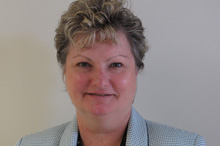 Priscilla Mondt is being honored as a Champion of Change for her efforts as a woman veteran.
Priscilla Mondt is being honored as a Champion of Change for her efforts as a woman veteran.
An old adage says, “God loves us too much to leave us the way we are.” I was taught early in my military career to “never walk by a mistake” and “never leave a place the way you found it.” Change does not happen in a vacuum; it usually requires the support of others both to empower and carry through the vision. One may have many ideas but these fall flat without others to embrace and execute them. In my work at the Veterans Healthcare System of the Ozarks in Fayetteville, Arkansas, there is a strong commitment to meeting the needs of the 55,000 Veterans and families served across three states. The paradigm shift for spiritual care, one-third of the holistic healthcare concept, was empowered by the leadership and implemented by a strong Chaplain Service team.
The term “spiritual care” has a broader definition than religion; it is “whatever gives a person meaning and purpose in life.” The need for spiritual interventions is especially realized during times of crisis and war. Chaplains attend to the wounds of the soul, those not visible to the human eye. I lead a team of strong spiritual leaders unusually gifted in abilities to assess and address needs of our country’s warriors. Physical and emotional needs are intertwined with spirituality and this group shifted the culture to a proactive stance to address needs of all Veteran populations served by our facility. Like shining light into darkness, when one area was addressed, it became obvious that another area needed attention. The expansion of spiritual care was patient-focused and guided by assessments and requests for services that include the many VA programs targeting both inpatients and outpatients.
Technology has changed the way people interact. While some view technology as personal and enhancing accessibility, it also sometimes distances people. Personal touch and interaction are often missing. Chaplains bring the personal dimension to Veterans, listening to their heartache, doubts, and fears, and replacing these with hope and assurance. However, by leveraging technology, the chapel worship services became digitized, allowing non-ambulatory inpatients to participate via close circuit television. This facility Chaplain Service became the first to field secure messaging, allowing electronic confidentiality between patient and chaplain. Tele-health capabilities and other such technological venues closed the gap on spiritual care services to Veterans outside the walls of the hospital.
Having served in the military during the transition from the Women’s Army Corps to integration into the Regular Army, I am committed to investment in the next generation of female leaders. This is reflected in two scholarships dedicated to inspiring women toward leadership and service. The Hazel Marsh Mondt Scholarship, named for my mother who was a World War II Veteran, is awarded annually to an Assemblies of God Theological Seminary female seminarian in pursuit of either military or Veterans Affairs Chaplaincy. The Priscilla Mondt Leadership Scholarship is awarded annually at Native American Bible College to a female or Veteran college student who demonstrates leadership. I am currently President of the Northwest Arkansas Chaplain Alliance (includes hospital, hospice, corporate, industrial, fire and police chaplains), working to promote change across many communities.
Drill sergeants intrigue me. They possess remarkable capabilities to quickly assess a raw recruit, motivate them appropriately and produce soldiers who will fight and defend our nation. Chaplains see similar transformations in the lives of Veterans as they invest in holistic care of our nation’s warriors. Wherever you are placed, your investment in the lives of others builds a stronger nation.
Chaplain Priscilla Mondt serves as Chief of Chaplain Service at Veterans Affairs Medical Center.
Learn more aboutOvercoming Obstacles: Continuing to Serve
Posted by on March 21, 2013 at 12:10 PM EDT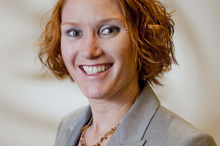 Dawn Halfaker is being honored as a Champion of Change for her efforts as a woman veteran.
Dawn Halfaker is being honored as a Champion of Change for her efforts as a woman veteran.
There are over 2.4 million Iraq and Afghanistan war veterans in the US, and many of our veterans and their families continue to face challenges during their transition from the military. Helping our veterans successfully transition to the civilian workforce is a critical mission; I strongly believe that finding meaningful employment is a powerful aspect of a transitioning veteran’s journey. Many veterans yearn to continue to contribute to something meaningful, and they are armed with the critical skills gained during their time in the military that are needed to succeed in the business world. However, veterans all too often face obstacles that prevent them from achieving their goals.
My unexpected journey as a wounded warrior began on a combat patrol in the early morning hours of June 19, 2004, when my dreams of serving as a career US Army Military Police Officer ended after I suffered life-threatening injuries on a dark, dusty street in Baquba, Iraq. Like many wounded warriors, I am extremely lucky to be alive. However, waking up to the reality of having lost my entire dominant right arm and other critical injuries was devastating. My life had changed. I struggled to accept and come to terms with my new reality. Even with the support of my family and military community at Walter Reed, my future was riddled with uncertainties and I struggled with self-doubt. I had lost my career, my sense of purpose, and my military community of support. The turning point of my recovery came as I witnessed the positive attitude and indestructible will of my fellow wounded warriors at Walter Reed Army Medical Center. They reassured me that a successful path to recovery took time, courage, and determination.
Fueled by my need and desire to continue to be part of the fight, I decided to forge my own path and start my own government contracting company. Today, after seven years in business, Halfaker and Associates, LLC (Halfaker) employs over 130 people dedicated to the principle of “Continuing to Serve.” Almost fifty percent of our employees are veterans, and our success is one example of how the skills that military veterans learned and used to accomplish any mission – such as developing a solid team of diverse individuals and being adaptable, resourceful and resilient – are directly transferable to the business world. By adopting policies to help bridge the transition from the military to corporate culture, we are reaping the benefits from our robust veteran workforce’s valuable skills. My proudest moments as an entrepreneur continue to be the opportunities I have to hire veterans to join my team. Most importantly, my company has served as a vehicle for me to promote issues that I am passionate about, such as helping wounded warriors and transitioning veterans. Over the past seven years, our employees have supported, volunteered, and participated in various causes throughout the community and have sponsored races to donate over $100,000 for the Wounded Warrior Project, a non-profit dedicated to fostering the most successful, well-adjusted generation of wounded service members in our nation's history.
I was first introduced to the Wounded Warrior Project during my recovery at Walter Reed, when volunteers brought me a backpack full of essential supplies. I opened up the backpack and saw some really useful things offered by these thoughtful volunteers. But what caught my attention most was a pair of men’s underwear. I was eager to offer the voice of a wounded female veteran and decided to volunteer with the group. In 2011, I was elected to serve as the President of the Board of Directors and I continue in that role today. I am lucky to be a part of many organizations that work to promote veteran employment and entrepreneurship, and advocate on behalf of wounded warriors. These organizations are vital in reassuring veterans that they are not alone in this journey and helping veterans navigate the civilian job market during their search for a meaningful career.
Many transitioning veterans struggle to find fulfilling employment and would benefit from the guidance of support organizations, outreach, and a supportive company culture. There are obstacles for businesses and veterans to overcome, but companies that invest in effectively recruiting and mentoring veterans reap substantial benefits by attracting and retaining employees who display the same adaptability, resilience and dedication in the civilian workforce as they did in serving their country. For corporations, the value of hiring a veteran goes well beyond the altruistic idea of giving back to those who have served our country. Ultimately, the organizations that choose to recruit and hire veterans gain big returns on their investments.
Dawn Halfaker serves as the President of the Board of Directors for the Wounded Warrior Project.
Learn more aboutHonor, Courage, and Commitment
Posted by on March 21, 2013 at 11:46 AM EDT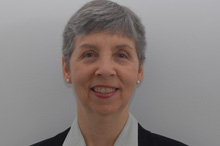 Glenna Tinney is being honored as a Champion of Change for her efforts as a woman veteran.
Glenna Tinney is being honored as a Champion of Change for her efforts as a woman veteran.
I am honored to be selected as a White House Champion of Change. I am humbled to be in the company of fourteen other extraordinary women veterans with amazing stories of courage, sacrifice, resilience, healing, recovery, hope, and service.
My journey began when I was born an Army brat at Fort Sill in Oklahoma. My father entered the Army in the enlisted ranks and, twenty years later, retired as a Major, so he had a very successful military career. He deployed to Korea for two tours during the Korean Conflict when I was very young. It wasn’t until I was much older that I realized my father struggled with his combat experiences for the rest of his life. I understand now that he had undiagnosed and untreated combat-related post-traumatic stress disorder (PTSD) and depression that he self-medicated with alcohol. I realize that he was plagued with survivor’s guilt for the men he lost while fighting in Korea. He never recovered from these experiences.
I am a retired Navy Captain. In 1980, I was one of the original twelve Navy social workers ever recruited for active duty. I spent 24 years in the Navy as a social worker. I had various duty stations in the continental United States and outside of the U.S., and traveled to military installations worldwide. I managed worldwide family violence and sexual assault programs. I served as the Deputy Executive Director for the Defense Task Force on Domestic Violence. We issued extensive recommendations to Congress and the Secretary of Defense to improve policies, procedures, and practices for handling domestic violence throughout the Department of Defense. After completion of the Task Force work, I worked on implementation of the Task Force recommendations. I retired in 2004, which was in the early days of Operation Enduring Freedom (OEF) in Afghanistan and Operation Iraqi Freedom (OIF).
I am also an activist and a victim advocate who has worked for nearly four decades to end violence against women. This work began back in the mid-1970s, when I was a newly graduated Master of Social Work (MSW) who wanted to change the world. I worked at a community mental health center and became involved in setting up the first battered women’s shelter and first rape crisis center in our community. This work established the foundation for my entire career. My mission has been and continues to be one of advocacy for and service to the vulnerable and disenfranchised in our society.
I bring all of these experiences and perspectives to the work I do now as the Military Advocacy Program Coordinator for the Battered Women’s Justice Project (BWJP), a national technical assistance provider for the Department of Justice’s Office on Violence Against Women (OVW). BWJP promotes change within the civil and criminal justice systems to improve their response to domestic violence and more effectively provide safety and justice to domestic violence survivors and their families. I also bring these perspectives to my role on the Advisory Council for the Business and Professional Women’s Joining Forces for Women Veterans Mentorship Program to assist women veterans in obtaining meaningful employment and a successful career of interest to them.
I manage the Building Effective Civilian Responses to Military-Related Victims of Intimate Partner Violence Project that is funded by OVW with Violence Against Women Act funds. I am responsible for developing a model coordinated-community-response to co-occurring incidents of combat-related post-traumatic stress disorder and intimate partner violence. This model addresses screening, assessment, and intervention for intimate partner violence and co-occurring conditions. I provide training to increase the capacity for military and civilian victim advocates, attorneys, and other providers to address the unique needs of military-related victims and offenders, and understand the challenges of advocating in these cases. An e-learning course I developed, Safety at Home – Intimate Partner Violence, Military Personnel, and Veterans, addresses the military and veteran infrastructures and resources for addressing intimate partner violence, the context of violence, risk and danger, combat stress, and the intersection of combat-related co-occurring conditions and intimate partner violence. I have established two national listservs to promote networking and information sharing between military and civilian subject matter experts and those working with the military-related population to enhance the quality of services for military personnel, veterans, and their families. I engage in the national dialogue to influence legal, military, veteran, and public policy developments nationwide that affect civil and criminal justice responses to intimate partner violence involving military personnel, veterans, and their families. This involves collaborating with a diverse group of stakeholders from the military, veteran, and civilian communities to ensure coordination of efforts and successful implementation of best practices in addressing intimate partner violence involving military personnel, veterans, and their families.
Are veterans of Operation Enduring Freedom (OEF) in Afghanistan and Operation Iraqi Freedom (OIF) different from my father? Not really. Most people who return from combat have some problems with reintegration and experience some combat stress reactions (e.g., bad dreams and nightmares, sleep disturbance, short temper, anger and rage, increased drinking and drug use) when they first return, but do not necessarily go on to have PTSD. Like my father, they are struggling with their combat experiences. They too have children who are growing up impacted by a parent who is impaired. Like my father, many of these veterans do not seek help and are trying to cope with their issues by themselves. They and their families are going through hell as they too try to work, raise families, and live some semblance of a normal life while continuing to experience the aftermath of their combat experiences. Some of these veterans are depressed and contemplate, threaten, or attempt suicide. Some are becoming involved with the criminal justice system for a range of crimes, including drug offenses, driving under the influence, intimate partner violence, sexual assault, murder, etc. They are accountable for their behavior, and it is never acceptable to abuse their intimate partners and children.
People who have been in combat are changed forever by that experience, as are their families. We cannot totally understand what they have been through even if they do talk to us about it, but we can be there to love and support them, hold them accountable for their behavior, help them get the assistance they need, and let them know that they are not alone.
I want to thank all of the amazing people who have been part of my journey. My family and friends have always been there for me even when I was traveling all over the world. I want to thank all of the dedicated and courageous people with whom I have worked over the years who are committed to ending violence against women. To military personnel, veterans, and their families, I want to thank you for your service, and I want to thank all of the people who support and care for our military personnel, veterans, and their families. Whether or not you have any connection to the military, I encourage you to learn more about how ten years of war have impacted our military personnel, veterans, and their families, and find a way to show your appreciation for the huge sacrifices they have made while serving our country.
Glenna Tinney currently serves as the Military Advocacy Program Coordinator for the Battered Women’s Justice Project.
Learn more aboutWhy Judge My Book By My Cover?
Posted by on March 21, 2013 at 11:10 AM EDT Michelle Racicot is being honored as a Champion of Change for her efforts as a woman veteran.
Michelle Racicot is being honored as a Champion of Change for her efforts as a woman veteran.
I was a U.S. Army Nurse Corps officer and trauma nurse. I loved and valued the times I was able to care for seriously wounded soldiers, and remember vividly the lives my team and I saved in Afghanistan. I also conducted presence patrols in and around the city of Ghazni, Afghanistan. Situated on a plateau in the central region of Afghanistan, Ghazni has a population of about 140,000 people and a long history of military invasions.
On one patrol, I was the figure of intrigue. A small tribe of local school girls approached me and giggled as I patrolled the area. Their eyes ranged in color from deep blue to light green and seemed large, hidden behind their head scarfs. They were fascinated by my appearance. I was female. My brown hair was tucked and braided under my kevlar helmet. I wore boots and had two weapons. Although I was able to smile at them briefly, I knew that my job was to help my fellow soldiers and scan for potential threats while patrolling the province.
With the interpreter at my side, the girls followed us for hours asking questions such as what my patch meant, had I gone to school, for how long, was I married, did I have children? I was probably an odd spectacle in their life. Yet I hoped with every answer I gave, that they too would be encouraged to go to college, become women leaders, and maybe even be nurses.
When I left the Army and transitioned to my new life as a veteran, I took those experiences and promised myself that I would continue to pursue my personal tradition of service in my community. I became a board member, then vice chair, of Cuidando los Ninos (CLNKids.org). CLNkids is a non-profit dedicated to address the needs of homeless families and ending childhood homelessness in Albuquerque, New Mexico. I work with legislators and local community members to educate them on homelessness and its far reaching effects in the community to include health and educational disparities, the rise of violence and PTSD, and how to work together as a community to end homelessness.
In addition, I am currently the vice executive director of the national organization American Women Veterans. The core mission of American Women Veterans is advocacy on behalf of military women, veterans and their families. Through speaking engagements and interviews with various groups, I explain the role of military women, as well as advocating for veteran issues such as PTSD and women in combat on a national and state level.
I enjoy the mentorship that comes with working with this organization. Through this advocacy work, I am able to connect with other service women, including amazing women like Genevieve Chase, our executive director. Genevieve is full of thoughtful ideas, challenges, and goals, such as how to build our board of directors or how to become more involved with advocacy at various leadership conferences around the nation. These suggestions sometimes overwhelm me and at other times inspire me to accomplish more, such as when I helped with the New York City Veterans Day parade.
In November of 2012, I helped coordinate American Women Veterans participation in the New York City Veterans Day parade. I gathered over twenty women veterans from various cities across the country. Throughout the day we marched, passed out fliers, stickers, and mementos, and were greeted along the streets of New York by other women veterans lost in the crowd of smiling faces, searching for a glimpse of recognition that they too served in the military side-by-side with our brothers at arms.
Often women veterans go unrecognized in the general public. While male veterans often wear hats proclaiming their service, women have no badge or insignia to signify their service, but instead work to find a balance between career and home life, while finding a new identity as a veteran and civilian. At times their transition can be lonely.
Most women are not recognized as serving in the military, let alone serving in combat. This can also cause delays in treatment when going to the Veterans Administration. I once experienced the frustration of overhearing an older male at the VA hospital while waiting for a dental exam. He said, “look at this young girl, probably here for her free teeth cleaning after doing her four years.” I was angry initially: who was this man to judge me? I am a veteran just like him, having served in multiple deployments. Why judge my book by my cover?
During the Veterans Day Parade, I was able to chat with Vickie, a fellow American Women Veterans member and United States Navy Veteran. Vickie is very involved in her community and is one of the first women I ever met at American Women Veterans. Whenever I see her, she calls me “little one,” like an older sister would. She continues to volunteer in and around NYC and at the VA in Bay Bridge. She works in counseling and understands, as I do, the challenges women veterans encounter. She wears a US NAVY ball cap to events we attend together and I can tell that, in her own way, she tells the world “I am a veteran.” She continues to remind me why I work so hard to advocate for change.
If Genevieve, Vickie, and I do not speak out for women veterans, I sometimes wonder who will. They, as well as other mentors in my life, serve as my personal motivation to keep working and striving, and to be that voice and advocate for change. All in a day’s work for this veteran.
Michelle Racicot is a Family Nurse Practitioner at an Urgent Care Center in Albuquerque, New Mexico.
Learn more about“Service” Does Not End When We Take Our Uniform Off: Finding A Purpose After Military Service.
Posted by on March 21, 2013 at 10:27 AM EDT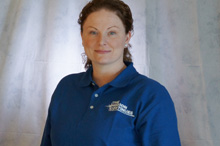 Natasha Young is being honored as a Champion of Change for her efforts as a woman veteran.
Natasha Young is being honored as a Champion of Change for her efforts as a woman veteran.
It is with great honor that I accept this award on behalf of all my brothers and sisters who paid the ultimate sacrifice. I wish I could start by citing some enchanted fairy tale beginning with, “Once Upon a Time.” Instead, I answered my nation’s call to service for many of the same reasons as many of my brothers and sisters did. College was not an option for me upon graduating from high school. So, when I was approached by a Marine Corps recruiter, not only did it make sense, but it was the first time in my young adult life that someone thought I could be more.
As it turned out Staff Sergeant Webster was right. The Marine Corps was an excellent fit for me. I excelled as a Marine. I worked hard and loved it even on the worst of days. When my twelve year career came to an end because of medical reasons I was devastated. After twelve years in the military, two tours in Iraq, and a successful tour on recruiting duty, I had to ask myself, “Who am I going to be, if I am not an active duty Marine?”
I was medically separated in October 2011 after being diagnosed with Lyme disease, skin cancer, and having my right knee reconstructed. In July 2012, I had to have a complete hysterectomy due to uterine cancer. I was thirty-one years old and a single mother. I felt that I had lost my identity, my career, and my health, and this definitive moment was officially my rock bottom. Then, my brother Julian Jaramillo mentioned a program called, “The Mission Continues,” and urged me to look into it. Reluctantly, I did.
I was accepted as a Mission Continues Fellow in January 2012, and what I gained was healthy dose of perspective. I served my fellowship at the Veterans Northeast Outreach Center in Haverhill, MA and, while I was no longer the youthful Marine I was once was, I realized I was still a Marine and I could contribute to my fellow veterans and my local community. It was my fellowship and that realization that saved my life and renewed my purpose to wake up each and every day to pay it forward to be a better mother, daughter, friend and human being. Our service does not end when we take that uniform off. For many of the veterans I know, service to others is stitched in the fabric of our character. This is why I work to convince my fellow veterans to serve in their communities once more. I am living proof that this model works.
I leave you with this: it does not matter if you are a veteran, a teacher, a student, or a housewife. We all have something to contribute and bring of value to our communities. Words without action are just words, and it is important for us to take the time to give back and build up our communities. The next time you meet a veteran, don’t just thank them for their service, get to know them. Chances are they are someone like me that may need a little perspective and a new purpose. While some stories are not all fairytales, some can have a happy ending.
Natasha Young is a Fellowship Recruitment Associate at The Mission Continues.
Learn more aboutAs the Phoenix Rises: Helping Veterans Find a New Normal
Posted by on March 21, 2013 at 9:48 AM EDT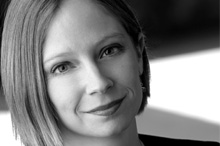 Kayla Williams is being honored as a Champion of Change for her efforts as a woman veteran.
Kayla Williams is being honored as a Champion of Change for her efforts as a woman veteran.
I took part in the initial invasion of Iraq while serving in the 101st Airborne Division (Air Assault) nearly a decade ago. As a military-trained Arabic speaker, I went on combat foot patrols with infantry troops in Baghdad, and my gender only mattered if it made civilian women more comfortable interacting with us. But when we came home, I didn’t fit the stereotypical image civilians had of veterans as men with close-cropped hair. Well-wishers would buy “the guys” a free round of beers, assuming my women comrades and I were wives or girlfriends. If I did mention that I was just back from the war, some asked whether as a woman I had been “allowed to carry a gun” while others asked if I were in the infantry (then banned by regulation). Most Americans had no idea what women troops were accomplishing, though women had already been honored for their valor, taken prisoner of war, wounded, and killed on the battlefield.
My husband sustained a penetrating traumatic brain injury from an improvised explosive device (IED) in Iraq, and I was struggling to help him recover cognitively and psychologically while simultaneously working to reintegrate myself into civilian society. For both of us, admitting our struggles and asking for help seemed an impossible violation of the military norms we had internalized – an embarrassing admission of weakness. Only once we saw that many of our peers were wrestling with similar challenges did we recognize the opportunity to share our own experiences as a way to push for systematic changes that would benefit other veterans.
Love My Rifle More Than You: Young and Female in the US Army, my memoir about my time in the military, afforded me a modest amount of notoriety that became a platform from which to champion change. Through media appearances, blogs and op-eds, panel discussions, public speaking events, and congressional testimony, I have sought to raise awareness about what women troops, veterans, and wounded warriors experience. I also used those venues to identify gaps in services that were making it harder to successfully transition home, lobby for improvements, and push for the removal of outdated laws and regulations, such as Don’t Ask, Don’t Tell and the Combat Exclusion Policy. In addition, I’ve worked with various groups inside and outside the government: I previously served on the VA Advisory Committee on Women Veterans and am a member of the board of directors of Grace After Fire (a nonprofit dedicated to helping women veterans). Currently, I am a Truman National Security Project fellow, sit on the advisory committee of the VA’s SERV study, and serve on the Army Education Advisory Committee.
Much attention has been paid to post-traumatic stress disorder. Less recognized is the potential for post-traumatic growth, a positive change that can come out of a major life crisis or traumatic event. The phoenix is a powerful symbol of this possibility, rising from the ashes of its predecessor. With proper support, veterans and others who have experienced trauma can also find a new normal in which they continue to serve. Advocating on behalf of those coming home after me – my way to be a champion of change – has been a way to heal myself by helping others.
Kayla Williams is the author of Love My Rifle More Than You: Young and Female in the U.S. Army.
Learn more about
- &lsaquo previous
- …
- 78
- 79
- 80
- 81
- 82
- 83
- 84
- 85
- 86
- …
- next &rsaquo
White House Blogs
- The White House Blog
- Middle Class Task Force
- Council of Economic Advisers
- Council on Environmental Quality
- Council on Women and Girls
- Office of Intergovernmental Affairs
- Office of Management and Budget
- Office of Public Engagement
- Office of Science & Tech Policy
- Office of Urban Affairs
- Open Government
- Faith and Neighborhood Partnerships
- Social Innovation and Civic Participation
- US Trade Representative
- Office National Drug Control Policy
categories
- AIDS Policy
- Alaska
- Blueprint for an America Built to Last
- Budget
- Civil Rights
- Defense
- Disabilities
- Economy
- Education
- Energy and Environment
- Equal Pay
- Ethics
- Faith Based
- Fiscal Responsibility
- Foreign Policy
- Grab Bag
- Health Care
- Homeland Security
- Immigration
- Innovation Fellows
- Inside the White House
- Middle Class Security
- Open Government
- Poverty
- Rural
- Seniors and Social Security
- Service
- Social Innovation
- State of the Union
- Taxes
- Technology
- Urban Policy
- Veterans
- Violence Prevention
- White House Internships
- Women
- Working Families
- Additional Issues

